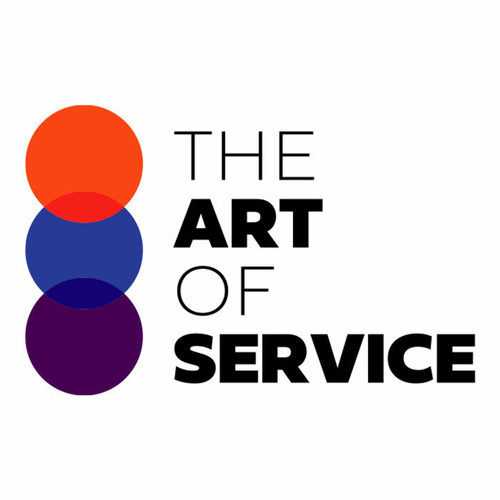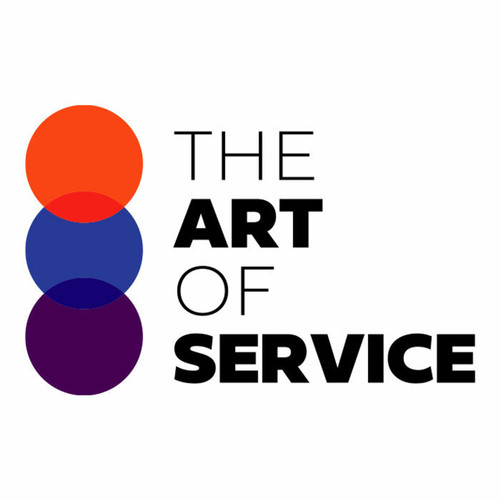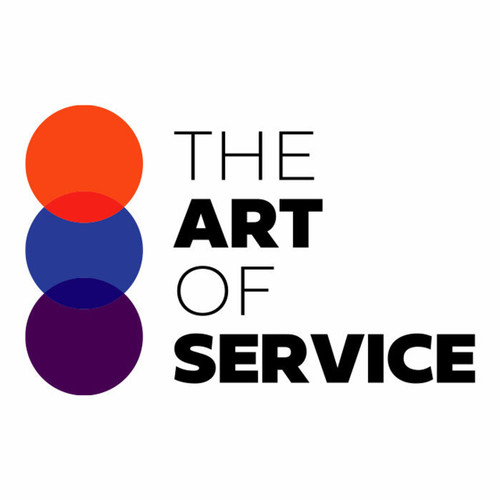Are you looking to improve your virtual team′s performance and collaboration in this rapidly changing remote world? Look no further than our Successful Virtual Onboarding in Managing Virtual Teams - Collaboration in a Remote World Knowledge Base.
Our comprehensive knowledge base is designed to equip you with the most important questions, solutions, and benefits for effectively managing virtual teams.
With 1514 prioritized requirements and case studies/use cases, you can easily navigate the challenges of remote work and achieve successful results.
Say goodbye to the confusion and frustration of managing a remote team.
Our knowledge base will provide you with a clear roadmap, helping you prioritize tasks by urgency and scope.
You′ll have all the tools you need to ensure your team is working together seamlessly, regardless of their physical location.
But what sets us apart from other resources? Our knowledge base is built on real-world experiences and best practices from successful virtual team managers.
You′ll learn from their mistakes and successes, saving you time, effort, and resources in the long run.
Don′t miss out on the opportunity to elevate your team′s performance and collaboration in the remote world.
Invest in our Successful Virtual Onboarding in Managing Virtual Teams - Collaboration in a Remote World Knowledge Base today and see the results for yourself.
Your team and your business will thank you.
Discover Insights, Make Informed Decisions, and Stay Ahead of the Curve:
Key Features:
Comprehensive set of 1514 prioritized Successful Virtual Onboarding requirements. - Extensive coverage of 137 Successful Virtual Onboarding topic scopes.
- In-depth analysis of 137 Successful Virtual Onboarding step-by-step solutions, benefits, BHAGs.
- Detailed examination of 137 Successful Virtual Onboarding case studies and use cases.
- Digital download upon purchase.
- Enjoy lifetime document updates included with your purchase.
- Benefit from a fully editable and customizable Excel format.
- Trusted and utilized by over 10,000 organizations.
- Covering: Online Collaboration, Team Culture, Remote Work Culture, Online Group Collaboration, Effective Remote Communication, Online Communication, Establishing Rapport, Prioritization Methods, Remote Engagement, Employee Satisfaction, Remote Supervision, Digital Project Planning, Collaborative Decision Making Process, Building Trust, Resource Allocation, Remote Productivity, Project Progress Tracking, Virtual Success Metrics, Virtual Collaboration Software, Performance Evaluation, Performance Management, Team Connection, Feedback Channels, Collaboration Challenges, Reward And Recognition, Digital Collaboration, Meeting Facilitation, Remote Employee Engagement, Remote Coaching, Data Security, Collaborative Decision Making, Project Collaboration, Remote Employee Onboarding, Remote Working Policies, Feedback Mechanisms, Effective Collaboration, Collaborative Project Management, Remote Team Building Activities, Virtual Leadership, Online Performance Monitoring, Leadership Skills, Virtual Team Productivity, Teleworking Policies, Virtual Team Training, Collaborative Decision Support, Collaborative Platforms, Remote Performance Evaluation, Team Performance Indicators, Remote Workflow, Distributed Team, Virtual Team Effectiveness, Communication Best Practices, Virtual Project Management, Team Progress Monitoring, Digital Employee Engagement, Collaboration Platforms, Remote Team Effectiveness, Digital Tools, Delegating Tasks, Team Bonding, Inclusive Leadership, Supervision Techniques, Peer To Peer Coaching, Remote Team Performance, Digital Leadership Development, Feedback Strategies, Relationship Building, Online Team Communication, Clear Goals, Team Alignment, Structured Communication, Remote Teams, Remote Hiring, Virtual Recruitment, Decision Making Processes, Collaborative Problem Solving, Remote Team Culture, Remote Meeting Strategies, Virtual Time Management, Managing Remote Employees, Project Management, Team Decision Making, Team Accountability, Virtual Workspace, Virtual Team Success, Knowledge Sharing, Online Training, Telecommuting Benefits, Digital Communication, Virtual Conflict Resolution, Virtual Training, Managing Workloads, Remote Leadership, Leadership Development Strategies, Remote Mentoring, Cultural Differences, Remote Onboarding, Goal Setting, Virtual Team Building, Telecommuting Strategies, Conflict Resolution Strategies, Managing Expectations, Multitasking Strategies, Remote Project Management, Effective Communication, Remote Performance Management, Remote Team Productivity, Successful Virtual Onboarding, Online Team Building, Remote Work, Team Collaboration Techniques, Virtual Brainstorming, Flexible Teamwork, Collaborative Technology, Teamwork Skills, Remote Project Planning, Virtual Office Space, Remote Time Management, Collaborative Work Ethic, Continuing Education, Work Life Balance, Team Dynamics, Productivity Tools, Conflict Resolution, Collaborative Strategies, Cross Functional Teams, Virtual Meetings, Virtual Project Delivery, Remote Performance Tracking, Managing Virtual Teams, Online Project Management, Distributed Decision Making, Virtual Workforce, Technology Integration, Time Management, Collaborative Workspaces, Communication Guidelines
Successful Virtual Onboarding Assessment Dataset - Utilization, Solutions, Advantages, BHAG (Big Hairy Audacious Goal):
Successful Virtual Onboarding
Future IT hires can utilize virtual onboarding methods such as online training and video conferences to access necessary information, tools, and resources for successful productivity.
1. Offer a comprehensive orientation program that includes information about virtual team processes, communication tools, and company culture. (Improved understanding and integration into the team)
2. Assign a mentor or buddy who can provide guidance and support during the onboarding process. (Personalized support and faster learning curve)
3. Provide access to online training and resources specific to virtual team work and remote collaboration. (Continuous learning and development opportunities)
4. Set clear expectations and goals for the new hire, with regular check-ins and feedback to track progress and address any challenges. (Clear guidance and measurable success)
5. Encourage open communication and networking among team members to foster relationships and facilitate information sharing. (Building a sense of camaraderie and shared knowledge)
6. Use technology such as video conferencing or virtual team-building activities to facilitate team bonding and relationship building. (Creating a positive team dynamic)
7. Consider providing a virtual onboarding guide or handbook with resources, FAQs, and tips for successful virtual work. (Easy access to important information and reference materials)
8. Schedule virtual coffee chats or informal check-ins with key stakeholders and team members to help the new hire get to know the team and understand their roles in the company. (Greater understanding of team dynamics and role expectations)
9. Encourage participation in virtual team meetings and projects from day one to help the new hire feel included and valued. (Sense of belonging and engagement)
10. Offer a reverse mentoring program where new hires can learn from more experienced virtual team members. (Knowledge sharing and different perspectives)
CONTROL QUESTION: What ways could future new IT hires find and learn what information is needed to become successful and productive?
Big Hairy Audacious Goal (BHAG) for 10 years from now:
In 10 years, the virtual onboarding process for new IT hires will be completely revolutionized. A big hairy audacious goal for successful virtual onboarding in 10 years is to create a seamless and efficient onboarding experience that fully equips new hires with the necessary knowledge and skills to hit the ground running and become successful and productive members of their teams.
To achieve this goal, technology will play a crucial role. Through the use of advanced artificial intelligence and personalized learning algorithms, the onboarding process will be tailored to each individual new hire, taking into account their unique learning style, skillset, and job role.
The onboarding platform will be highly interactive and engaging, utilizing cutting-edge virtual reality technology to provide immersive training experiences. New hires will be able to take part in simulated work scenarios, giving them hands-on practice in a controlled environment.
In addition, there will be a strong focus on collaboration and community-building during the onboarding process. New hires will have access to online forums and social spaces where they can connect with their fellow new hires, as well as experienced team members who can provide guidance and support.
One of the most innovative aspects of this future virtual onboarding process will be the incorporation of gamification. By turning learning into a game, new hires will be more motivated to actively participate and retain the information being presented to them.
Furthermore, data analytics and performance tracking will be integrated into the onboarding process to track the progress of new hires and identify any areas for improvement. This will allow for a continuous improvement cycle, ensuring that the onboarding process evolves and adapts to the changing needs and trends in the IT industry.
In summary, the ultimate goal for successful virtual onboarding in 10 years is to create a dynamic and personalized learning experience that empowers new IT hires to quickly and confidently contribute to their teams and thrive in their roles. With the use of advanced technology, collaboration, and gamification, this vision is within reach.
Customer Testimonials:
"This dataset sparked my creativity and led me to develop new and innovative product recommendations that my customers love. It`s opened up a whole new revenue stream for my business."
"I am impressed with the depth and accuracy of this dataset. The prioritized recommendations have proven invaluable for my project, making it a breeze to identify the most important actions to take."
"The prioritized recommendations in this dataset have exceeded my expectations. It`s evident that the creators understand the needs of their users. I`ve already seen a positive impact on my results!"
Successful Virtual Onboarding Case Study/Use Case example - How to use:
Client Situation:
XYZ Corporation is a leading technology company that constantly invests in new talent to stay ahead of the competition and drive innovation. As part of their growth strategy, the company plans to hire several new IT professionals in the upcoming year. However, with the current remote work arrangement due to the pandemic, the traditional onboarding process of in-person training and face-to-face interactions is not feasible. The HR team is facing the challenge of providing a successful virtual onboarding experience for the new hires to ensure they have all the information and resources needed to become productive and successful in their roles.
Consulting Methodology:
To address the client′s situation, our consulting team used a holistic approach that focused on three key areas: Technology, Communication, and Support.
Technology: The first step was to ensure that the IT infrastructure was equipped to support virtual onboarding. This involved conducting a thorough assessment of the existing systems and software used for onboarding and identifying any gaps or areas that needed improvement. Based on the assessment, we recommended the implementation of a cloud-based onboarding platform that would enable new hires to access all onboarding materials remotely. We also suggested the use of video conferencing tools for virtual orientation and training sessions.
Communication: Effective communication is crucial for successful onboarding, especially in a remote work environment. We implemented a communication plan that included regular check-ins with the new hires before and during the onboarding process. This helped us establish a personal connection with the new hires and address any questions or concerns they may have had. We also set up virtual team meetings to introduce the new hires to their colleagues and facilitate networking.
Support: The key to a successful onboarding experience is providing the necessary support to new hires. We developed a comprehensive onboarding guide that provided a clear roadmap for the new hires, outlining what information they needed to know and where to find it. We also established a mentorship program, pairing the new hires with experienced employees who could guide them through the onboarding process and offer support and advice.
Deliverables:
1. Onboarding technology assessment report
2. Implementation of a cloud-based onboarding platform
3. Communication plan
4. Virtual orientation and training sessions
5. Onboarding guide
6. Mentorship program
Implementation Challenges:
The biggest challenge we faced was the rapid shift to a virtual onboarding process due to the pandemic. This required us to quickly adapt our strategies and approach to ensure a seamless and effective onboarding experience. Additionally, since the new hires would not have the opportunity to physically interact with their colleagues, it was crucial to find ways to build a sense of camaraderie and connection virtually.
KPIs:
1. Time-to-productivity: This measures the time it takes for new hires to become fully productive in their roles. A successful virtual onboarding process should minimize the time it takes for new hires to contribute to the company′s goals.
2. Retention rate: This measures the percentage of new hires who stay with the company after a year. A well-executed onboarding process can significantly improve retention rates.
3. Employee satisfaction: This measures the satisfaction level of the new hires with the onboarding process. Regular surveys and feedback sessions can help assess this KPI.
Management Considerations:
It is essential for the HR team and managers to be actively involved in the virtual onboarding process to ensure its success. Managers should make time to regularly check-in with their new hires, provide guidance and support, and facilitate their integration into the team. The HR team should also continuously review and update the onboarding process based on feedback from new hires and make improvements as needed.
Citations:
1. Aon Hewitt, Effective Virtual Onboarding: Beyond the Basics, 23 July 2020.
2. Harvard Business Review, Onboarding is the Missing Link in Diversity Programs, 12 March 2020.
3. Deloitte, Virtual Onboarding: How to Make New Hires Feel Welcome While Working Remotely, 21 April 2020.
4. Society for Human Resource Management, Remote Onboarding in Challenging Times, 13 April 2020.
5. McKinsey & Company, Reimagining Onboarding in the Era of Virtual Work, 8 May 2020.
Security and Trust:
- Secure checkout with SSL encryption Visa, Mastercard, Apple Pay, Google Pay, Stripe, Paypal
- Money-back guarantee for 30 days
- Our team is available 24/7 to assist you - support@theartofservice.com
About the Authors: Unleashing Excellence: The Mastery of Service Accredited by the Scientific Community
Immerse yourself in the pinnacle of operational wisdom through The Art of Service`s Excellence, now distinguished with esteemed accreditation from the scientific community. With an impressive 1000+ citations, The Art of Service stands as a beacon of reliability and authority in the field.Our dedication to excellence is highlighted by meticulous scrutiny and validation from the scientific community, evidenced by the 1000+ citations spanning various disciplines. Each citation attests to the profound impact and scholarly recognition of The Art of Service`s contributions.
Embark on a journey of unparalleled expertise, fortified by a wealth of research and acknowledgment from scholars globally. Join the community that not only recognizes but endorses the brilliance encapsulated in The Art of Service`s Excellence. Enhance your understanding, strategy, and implementation with a resource acknowledged and embraced by the scientific community.
Embrace excellence. Embrace The Art of Service.
Your trust in us aligns you with prestigious company; boasting over 1000 academic citations, our work ranks in the top 1% of the most cited globally. Explore our scholarly contributions at: https://scholar.google.com/scholar?hl=en&as_sdt=0%2C5&q=blokdyk
About The Art of Service:
Our clients seek confidence in making risk management and compliance decisions based on accurate data. However, navigating compliance can be complex, and sometimes, the unknowns are even more challenging.
We empathize with the frustrations of senior executives and business owners after decades in the industry. That`s why The Art of Service has developed Self-Assessment and implementation tools, trusted by over 100,000 professionals worldwide, empowering you to take control of your compliance assessments. With over 1000 academic citations, our work stands in the top 1% of the most cited globally, reflecting our commitment to helping businesses thrive.
Founders:
Gerard Blokdyk
LinkedIn: https://www.linkedin.com/in/gerardblokdijk/
Ivanka Menken
LinkedIn: https://www.linkedin.com/in/ivankamenken/







